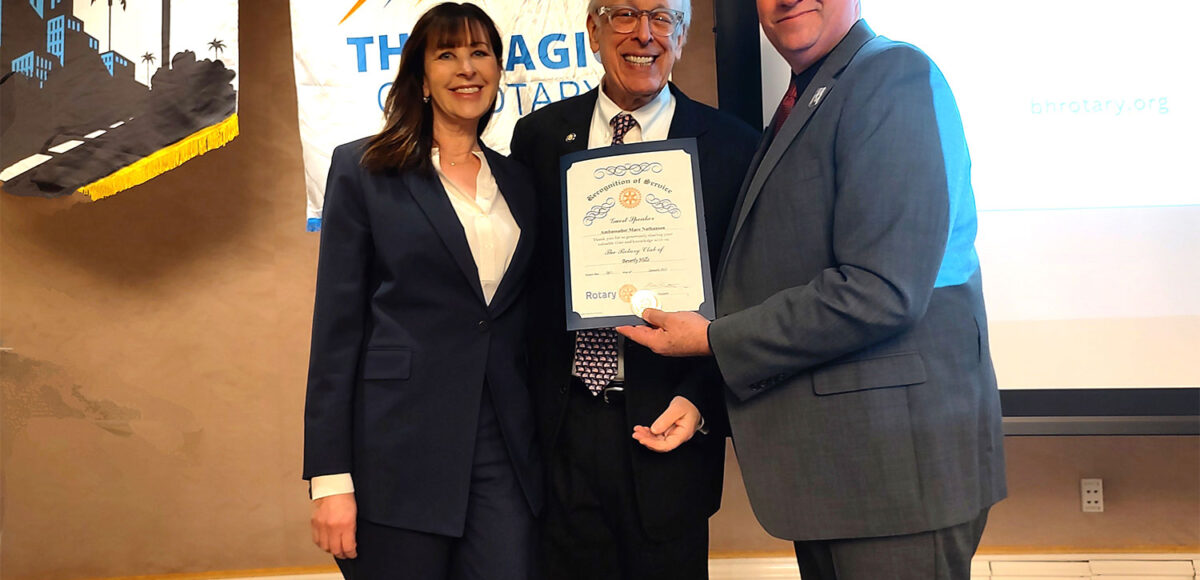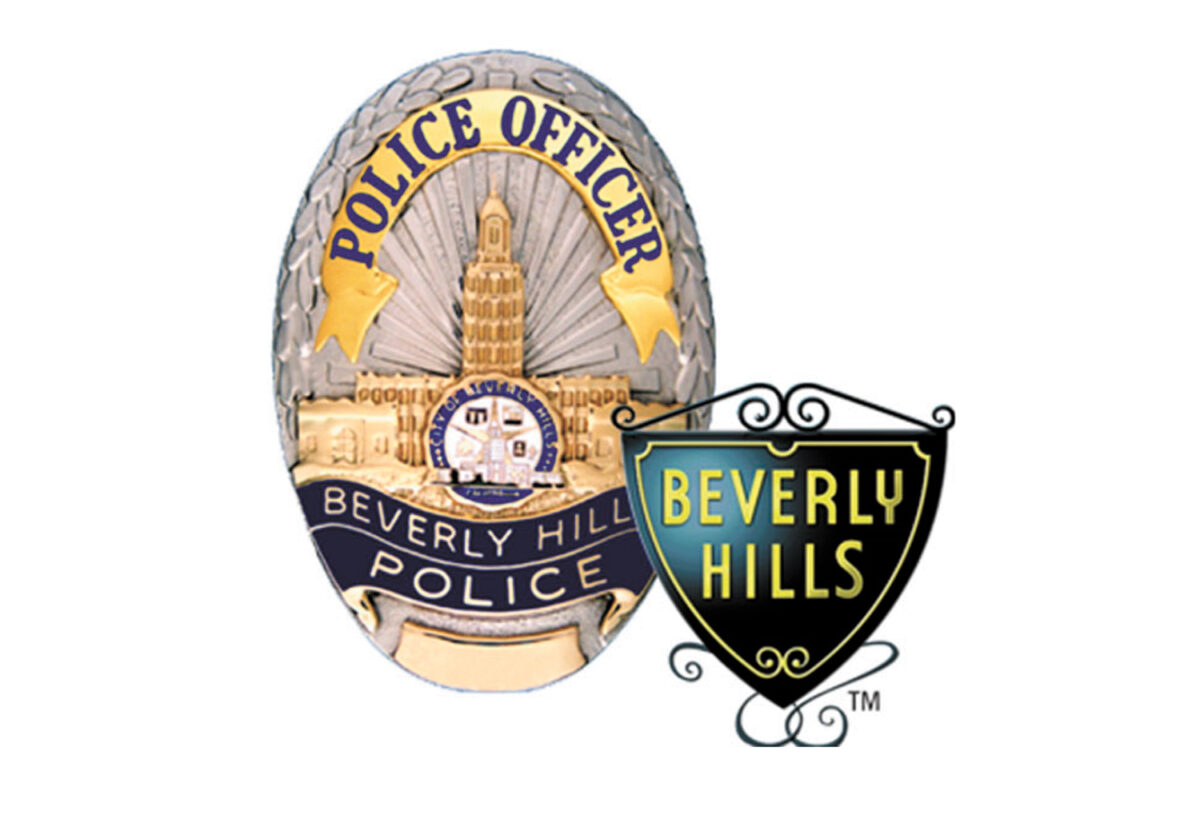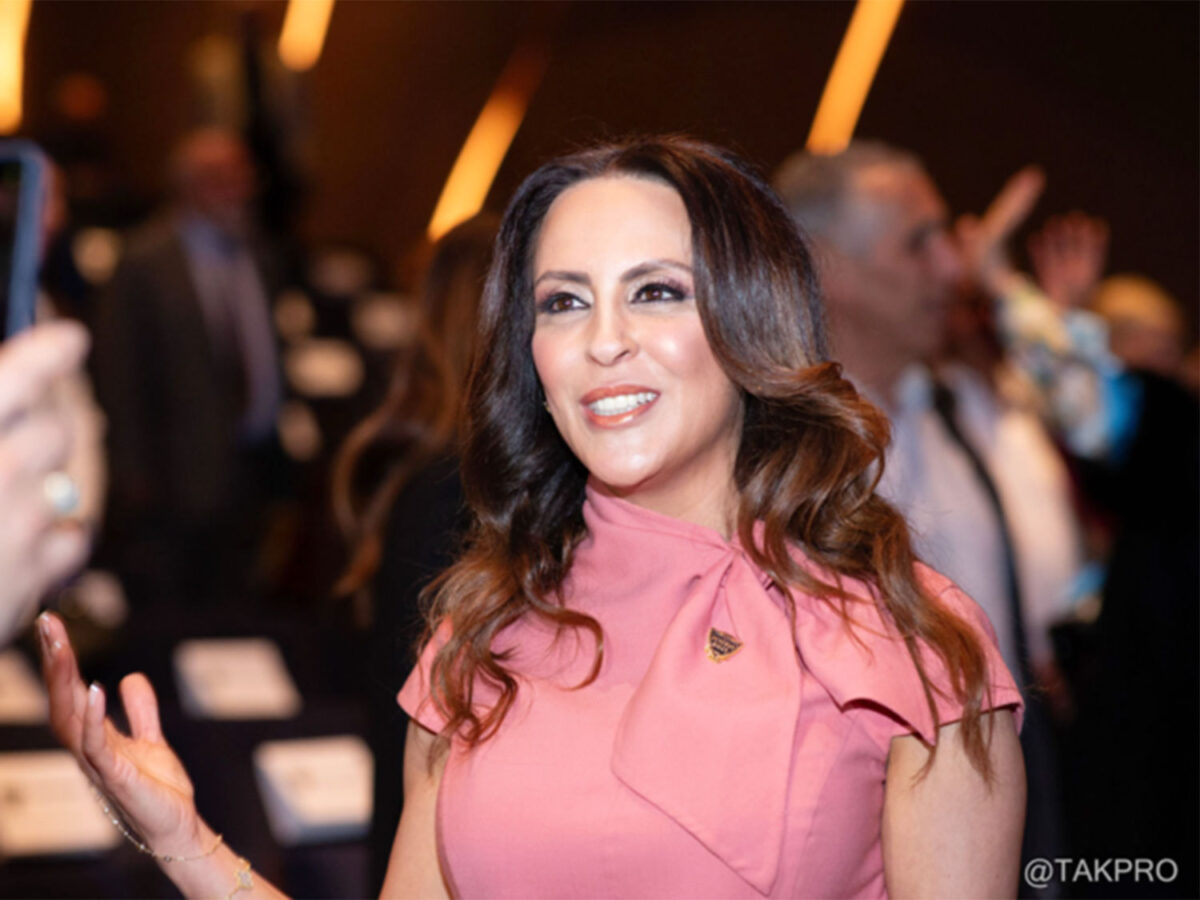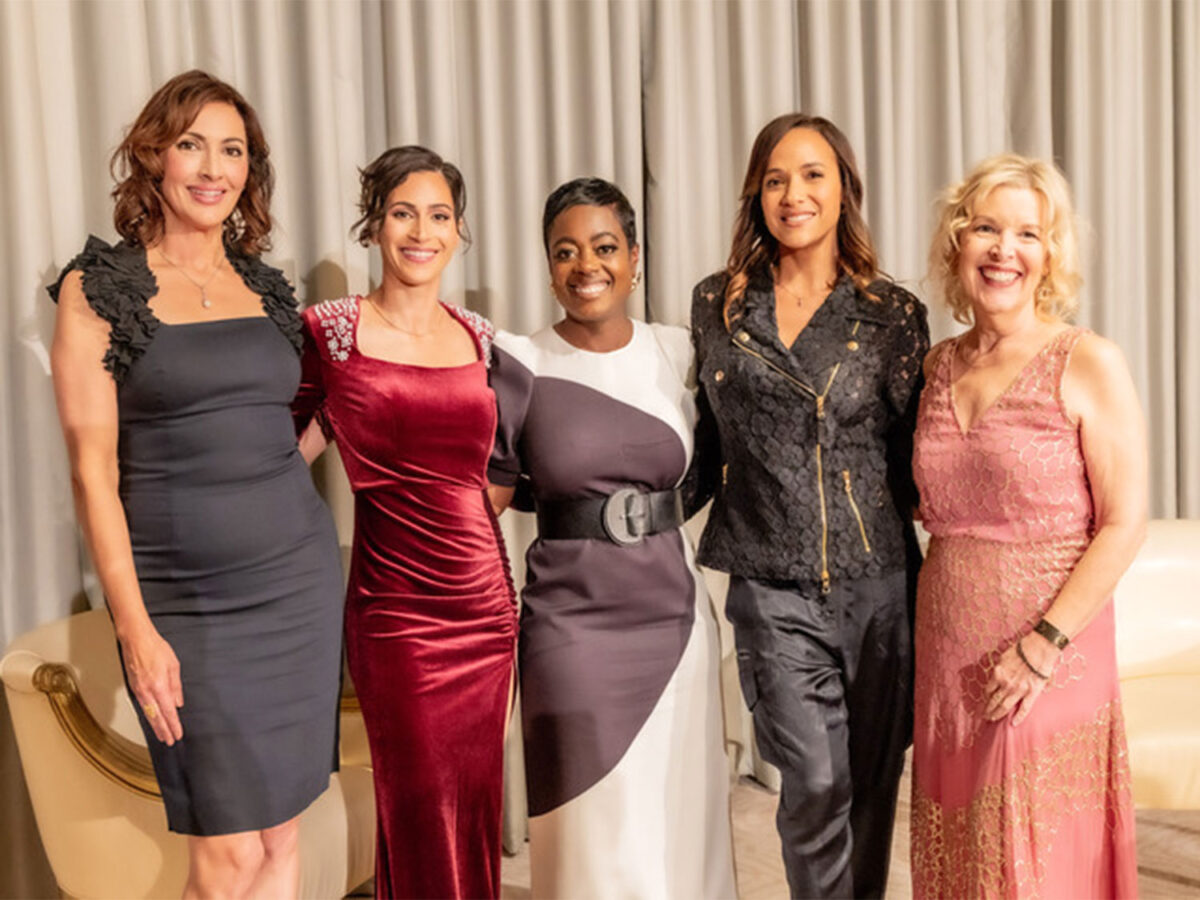Ambassador Marc Nathanson addressed the Rotary Club of Beverly Hills’ first luncheon meeting of the new year. One of the country’s foremost communications entrepreneurs and philanthropists, Nathanson served as U.S. ambassador to the Kingdom of Norway from 2022 to 2024. His luncheon address offered insightful, humorous and sobering glimpses of that diplomatic experience.
Former Mayor Julian Gold, M.D., introduced Nathanson, noting that the ambassador’s term coincided with the start of the current Russian-Ukrainian conflict.
“He had lots to do with strengthening the relationship between Norway and the United States and achieving significant milestones in many of the military sorts of cooperations that we created,” said Gold.
Gold noted that the ambassador had earned “enormous accolades” for his accomplishments, which include the founding of Falcon Cable TV and serving as Vice Chairman of Charter Communications. Nathanson served as Chairman of the United States Agency for Global Media during the Clinton-Gore and Bush-Cheney Administrations; Representative to the Board of Governors of the East-West Center in Honolulu; Co-Chairman of the Pacific Council on International Policy; and Vice Chairman of the National Democratic Institute for International Affairs. He is a member of the Council on Foreign Relations and a long-standing Trustee of the Aspen Institute.
He was also familiar to the audience. Nathanson and his wife lived in Beverly Hills for 19 years, and two of his children graduated from Beverly Hills High School. His company, Mapleton Investments, is based in Beverly Hills, granting him, in Gold’s words, the status of “Beverlyhillsian.”
“I’d like to tell you about my experiences as a U.S. ambassador for the last almost two years and a little bit about Norway in general, because I find most Americans don’t know a lot about Norway, and it’s a fascinating country,” Nathanson began.
Norway, explained Nathanson, is small but mighty. Though its population is only 5.5 million, Norway holds critical importance on the geopolitical front for several reasons. Foremost among them is its border with Russia.
“The second fleet of Russia is based across from Norway in Siberia, across from the Norwegian city of Kirkenes. And in addition to that, Russia does all its testing of its weapons in that part of the world. So, the United States and Norway are very close in sharing intelligence about what the Russians are doing. And Norway was an original member of NATO as the United States. But one of our most important achievements as the U.S. ambassador, along with the other U.S. ambassadors in the Nordic countries, was to get Sweden and Finland to join NATO, which we’re very happy that occurred,” said Nathanson.
Norway, he noted, is the richest country in Europe, with a government sovereign fund of $1.7 trillion. It is also a relatively new country, only gaining independence from Sweden in 1905. The country is 98% English-speaking.
Between 1880 and 1930, one million Norwegians settled in the United States. Many ended up in Minnesota, Wisconsin and the Dakotas, as well as Seattle because of its shipping industry.
The current King of Norway happens to be staunchly pro-American.
“When I first presented my credentials to the King of Norway, he said to me, ‘Let me tell you a story.’ Now, he’s 88 years old today, and he said the Nazis invaded Norway. Norway was neutral, but the Nazis and Hitler wanted oil, gas, iron ore, and shipping of steel from Sweden. The ports were in Norway. So, Hitler invaded Norway and stationed 250,000 Nazi troops in Norway. The current king’s grandfather and his father fled to England to lead the resistance. But his mother, who was the Crown Princess Martha at the time, went to the United States with the current king and his two sisters. Where did they stay? In the White House with President Roosevelt. The current king was 5 years old and they lived there until he was 10 years old. In the last year or so, they moved to a home in Maryland. But the United States was the home for the royal family in Norway. And if any of you have seen the PBS series, ‘Atlantic Crossing,’ it is about the Norwegians living in Washington and about Roosevelt. Martha is very important historically because she was one of the many people who pushed Roosevelt into entering World War II. And that has been very well documented,” said Nathanson.
In 1969, the country’s fate changed dramatically after Exxon and Mobil discovered oil on Norway’s continental shelf. The Norwegian government agreed to allow the extraction of its natural resources in exchange for, among other things, 50 percent of the profits.
The wealth of the country funds its famous socialism.
“It is a very socialistic country, even though it’s a democracy, even though there are more billionaires per capita in Norway than in the United States. They have free healthcare, free medicine, free education through Ph.D. or medical school,” Nathanson said.
The government also pays 25 % of all expenses of the country’s 250 daily newspapers.
“They feel a free press, an active press is in the best interest of a democracy,” he said.
Nathanson added, “There’s no student debt, there is no homelessness. There is almost no crime in Norway now; it’s a cashless society. Everything’s done with credit cards. So that may have something to do with it.”
On the other hand, the system is not utopian.
Nathanson relayed the story of his wife wanting a particular type of eye drop not on the approved government list. The price quoted was $700.
“You don’t have much choice. The government picks the medicine and it’s only one brand, and you either have to take that brand, it doesn’t cost you anything, but if you want another brand or you want to go to your own specialist, you have to go to Germany or England to see a doctor there. So, it’s not a perfect system, but there is no poverty. There’s a huge middle class in Norway. Now, I must say, I always felt when we lived in Beverly Hills, they had great police and fire and emergency responders. They have that in Norway as well, but it’s throughout the country. It’s not just in one area of the city or another area. And Oslo, a metro area, has nearly a million people now. It’s very green. They have electric cars. Seventy percent of all cars and trucks are electric,” said Nathanson.
He then touched on the country’s relationship with firearms.
“Norwegians are avid hunters. Most Norwegians own rifles and hunt, even though there’s very little violent crime in Norway with firearms, because they use a system where when a boy or girl becomes 16 and they want to own a rifle, they have to go to training and then they have to join a club that does gun safety.”
As for the current conflict between Russia and Ukraine, Nathanson noted, “Norway is the biggest provider of aid and military assistance to Ukraine. And that was a first, because Norway has always provided aid throughout the world to countries because of its great wealth, but they haven’t provided military aid. They made an exception because of Ukraine. And I gave an address at a conference when I first arrived. I compared Hitler’s invasion of Norway in April 1940 to Putin’s invasion of Ukraine. Well, the Russian ambassador immediately attacked me on all of the services. And we spent the next day on the front lines of Russia and Norway. Shortly thereafter, as you know, Finland joined and later Sweden joined NATO, and today they have a united front against Russian aggression. So, this was a very, very important step of what was going on.”
Toward the end of his remarks, Nathanson spoke of Norway as a gateway to one of the last frontiers on earth, the Arctic.
“As the ice is melting, not only Russia, but China is extremely interested in the polar route from China, and this is very important for Norway. And with the help of the Secretary of State Tony Blinken, we got permission from the State Department to open an American Presence Post in Tromso, the largest Norwegian city in the Arctic. And we now have American State Department people, a very small office up there, but to focus on the Arctic, not only because the Russians are there and all the Russian weapon testing is there, but because of the melting of all of the glaciers. They’re melting four times faster than anywhere else on Earth,” said Nathanson.
He urged the audience to visit Norway and the Arctic in particular.
“The northernmost city in the world near the North Pole is Longyearbyen, which is in Norway, and it’s the closest city to the North Pole. It only has 2,500 people. But it’s very, very interesting to see because you see the glaciers. And in addition to that, the seed vault is there. They actually take the seeds of all crops of all food, and they put the seeds in a permafrost in the ice in caves in Norway in case there’s a disaster and they have to regrow the plants.”
Nathanson then came full circle from his tales of the Arctic, back home to Beverly Hills.
He described one of his last official acts as ambassador.
“I had the great honor to pick the career State Department diplomat who would be the DCM (Deputy Chief of Mission), the number two person at the embassy. And when there’s no ambassador, the DCM runs the embassy. They are the chargé d’affaires. And I chose, as I know, all of you would’ve chosen, an outstanding young man named Eric Meyer from Beverly Hills. He is now running everything, doing a much better job than I ever could, and I am so proud of Eric and his father and brother [Bruce and Evan Meyer] are right here, and I’m so proud of him.”







